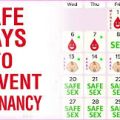An unintended pregnancy is a pregnancy that is unwanted, such as a pregnancy that occurred when no children or no more children were desired. Or the pregnancy is mistimed, such as the pregnancy occurring earlier than desired. The concept of unintended pregnancy helps in understanding the fertility of populations and the unmet need for contraception, also known as birth control, and family planning. Most unintended pregnancies result from not using contraception or from not using it consistently or correctly.
An unplanned pregnancy can be quite a shock, but there’s no reason to panic. You’re not alone. Almost half of all pregnancies in the U.S. are surprises. Prevention is always better than cure. If you and your partner are sexually active, make sure you both are aware of how to reduce the risks of getting pregnant. Whether it is a premarital or living-in relationship or just a casual relationship, unwanted pregnancy is something no one wants to end up with.
What Types of Pills Can I Use to Avoid Pregnancy After 72 Hours?
Pregnancy occurs when a sperm fertilizes an egg after it’s released from the ovary during ovulation. The fertilized egg then travels down into the uterus, where implantation occurs. A successful implantation results in pregnancy. Several morning-after pills are available, both over the counter and by prescription.
These pills aren’t intended as regular forms of birth control. Instead, they can act as a backup if you have unprotected sex or forget to use your regular form of birth control. They must be used within 120 hours (five days) of sexual contact to be effective. Some pills are most effective when taken within 72 hours (three days).
These pills must be taken within 72 hours of unprotected sex in order for them to be effective in preventing unplanned pregnancy. Take within 72 hours of unprotected sex. One dose of 100 µg ethinylestradiol + 500µg levonorgestrel (2-4 birth control pills), 12 hours later a second dose.
Types of emergency contraceptive pills that work within 72 hours include; Postinor 1, Postinor 2, Postpill, Levon 2, and Unwanted-72 Tablet these Emergency contraceptive pills prevent pregnancy by preventing or delaying ovulation and they do not induce an abortion.
Although there are no emergency contraceptive pills that work well after 72 hours, a copper IUD can prevent pregnancy after 72 hours. When inserted within 120 hours of unprotected intercourse, a copper-bearing IUD is more than 99% effective in preventing pregnancy. This is the most effective form of emergency contraception available. Once inserted, women can continue to use the IUD as an ongoing method of contraception, or may choose to change to another contraceptive method. The copper-bearing IUD prevents fertilization by causing a chemical change in sperm and egg before they meet.
Who can use emergency contraception?
Any woman or girl of reproductive age may need emergency contraception to avoid an unwanted pregnancy. There are no absolute medical contraindications to the use of emergency contraception. There are no age limits for the use of emergency contraception. Eligibility criteria for the general use of a copper IUD also apply for use of a copper IUD for emergency purposes.
In what situations can emergency contraception be used?
Emergency contraception can be used in a number of situations following sexual intercourse. These include:
When no contraceptive has been used.
Sexual assault when the woman was not protected by an effective contraceptive method.
When there is a concern of possible contraceptive failure, from improper or incorrect use, such as:
- condom breakage, slippage, or incorrect use;
- 3 or more consecutively missed combined oral contraceptive pills;
- more than 3 hours late from the usual time of intake of the progestogen-only pill (minipill), or more than 27 hours after the previous pill;
- more than 12 hours late from the usual time of intake of the desogestrel-containing pill (0.75 mg) or more than 36 hours after the previous pill;
- more than 2 weeks late for the norethisterone enanthate (NET-EN) progestogen-only injection;
- more than 4 weeks late for the depot-medroxyprogesterone acetate (DMPA) progestogen-only injection;
- more than 7 days late for the combined injectable contraceptive (CIC);
- dislodgment, breakage, tearing, or early removal of a diaphragm or cervical cap;
- failed withdrawal (e.g. ejaculation in the vagina or on external genitalia);
- failure of a spermicide tablet or film to melt before intercourse;
- miscalculation of the abstinence period, or failure to abstain or use a barrier method on the fertile days of the cycle when using fertility awareness-based methods; or
- expulsion of an intrauterine contraceptive device (IUD) or hormonal contraceptive implant.
There is a chance that pill contraceptive pills can fail and you can fall pregnant. If your period is late/delayed, light, or shorter than normal, consider having a pregnancy test. This is available free of charge in most sexual health and reproductive health clinics.





